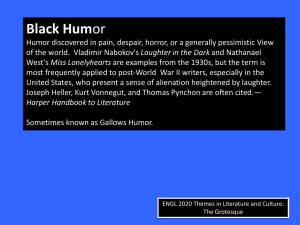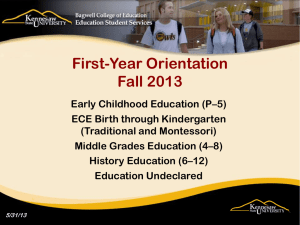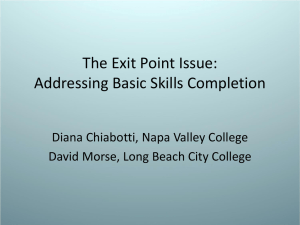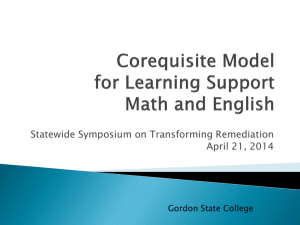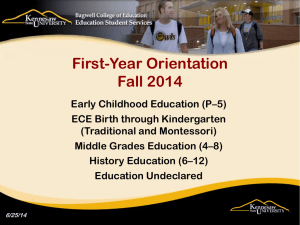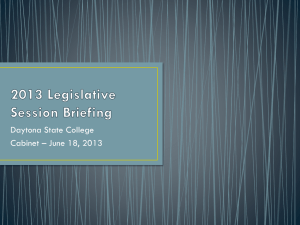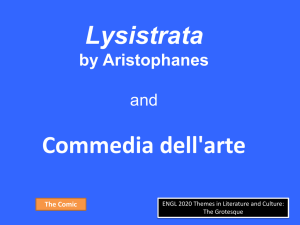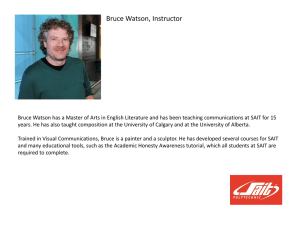View PowerPoint presentation - Communication Across the
advertisement
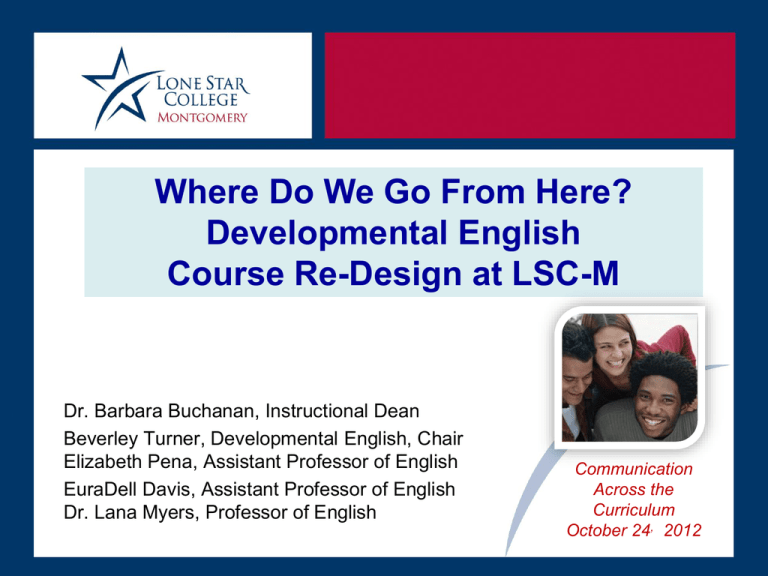
Where Do We Go From Here? Developmental English Course Re-Design at LSC-M Dr. Barbara Buchanan, Instructional Dean Beverley Turner, Developmental English, Chair Elizabeth Pena, Assistant Professor of English EuraDell Davis, Assistant Professor of English Dr. Lana Myers, Professor of English Communication Across the Curriculum October 24, 2012 Presentation Agenda • Where we started • Where we are now • Where we want to go The Problem • Nationwide, Developmental students experience low success, completion, and retention rates • Developmental Education Research Suggests: • “Among those who take remedial classes, the more remedial coursework taken [is associated] with the least likelihood of educational success” (Russell, 2008, p. 3). • “About one-quarter of all students referred to three levels below college level for both math and reading drop out between courses” (Bailey, 2009, p. 14). A First Step to Course Re-Design Demonstration Projects Grant • LSC-M Receives Developmental Education Demonstration Project (DEDP) Grant Award (Two year grant - Summer 2010 through Summer 2012) • Five Texas community colleges received a DEDP grant from the Texas Higher Education Coordinating Board (THECB) in July 2010 • LSC-Montgomery is the only single-college campus to receive funding • Original award $1.5 million Vision for the DEDP Grant: • To accelerate and encourage students’ progress and success in the developmental sequence and support their transition into creditbearing academic/technical certification programs or degrees A First Step to Course Re-Design Demonstration Projects Grant (Cont.) DEDP Goals 1. Increase developmental student success 2. Accelerate the progress of students through the developmental sequence 3. Increase organizational capacity to provide student advising, counseling and mentoring 4. Provide professional development for training and support of developmental education faculty, counselors, advisors, and mentors Status of Developmental English Prior to DEDP Grant • Zero full-time faculty were100% dedicated to Developmental English – Selected full-time faculty typically taught 1 DE course per semester – The remainder of the sections were taught by adjuncts • Little professional development available which focused on Developmental English • Reading and writing were taught as separate courses with specialized curricula, syllabi, and textbooks – Two levels of reading (ENGL 0304 and ENGL 0305) – Two levels of writing (ENGL 0306 and ENGL 0307) • A homegrown, faculty developed lab comprised the 1 hour lab component of the course • There were few opportunities for accelerating the Developmental sequence Developmental English Department’s DEDP Curriculum Re-Design Fall 2010 to Present • Additional Linked / Accelerated class options for students: • HUMD and EDUC 1300 linked to 0309 or 0302 (4 sections) (fall 2012) • All four Dev. English classes + 1 student success course (fall 2010; fall 2011) • One upper-level Dev. English reading or writing course combined with speech, psychology, or sociology • Gateway Developmental English (Developmental Writing II) paired with Composition and Rhetoric I (college-level English) • Developmental Writing Review (four week course) paired with Composition and Rhetoric I (12 weeks of college-level English) • Integrated Reading and Writing Courses • • Integrated Reading and Writing I (ENGL 0302) Advanced Developmental Reading and Writing (ENGL 0309) Genesis of Integrated Reading and Writing at LSC-M • Texas Higher Education Coordinating Board (THECB) charge (Granting agency): • Combine upper-level reading and writing to accelerate students’ progress through the developmental sequence • During the DEDP grant, all five DEDP colleges piloted upperlevel IRW courses with identical: • • • • • Textbooks (Bedford textbooks) Syllabi Learning Outcomes Curricula Lab Software (from Bedford) Integrated Reading and Writing at LSC-M (Cont.) • College and Universities Combining Reading and Writing – All five DEDP colleges • • • • • Lone Star College – Montgomery Alamo Colleges El Paso Community College San Jacinto College Tarrant County College – Other institutions across the country • • • • • UT Austin UT Pan American San Francisco State University Chabot College (California) North Carolina Community Colleges Integrated Reading and Writing at LSC-M (Cont.) Two new, integrated courses developed: • ENGL 0302: Integrated Reading and Writing I (full-scale in fall 2012) • [Dev. Writing I (0306) + Dev. Reading I (0304)] • ENGL 0309: Advanced Developmental Reading and Writing (piloted spring 2011, fall 2011, and spring 2012; full-scale in fall 2012) • [Dev. Writing II (0307) + Dev. Reading II (0305)] • Each course meets four hours per week – 3 lecture; 1 hour lab (An additional hour of classwork per week is required to be completed in the Dev. English Homework Lab – 10% of students’ grade) Integrated Reading and Writing at LSC-M (Cont.) • Scaling of Integrated Reading and Writing Pilots • Spring 2011 – 25 students; 2 sections (ENGL 0309) • Fall 2011 – 60 students; 3 sections (ENGL 0309) • Spring 2012 – 44 students; 3 sections (ENGL 0309) • Fall 2012 (44 sections; 850+ students; 20 student cap) • 6 sections (ENGL 0302) • 38 sections (ENGL 0309) Dev. English Classrooms and Class Caps • Dev. English Computer Classrooms - 24 computers each • Class caps • Previously - 24 students • Starting in fall 2012 - 20 students Dev. English Course Sections Prior to Full-Scale IRW Fall 2011 Courses # of sections ENGL 0112: Developmental Writing Review ENGL 0304: Developmental Reading I ENGL 0305: Developmental Reading II ENGL 0306: Developmental Writing I ENGL 0307: Developmental Writing II ENGL 0309: Advanced Developmental RW 0 6 12 6 13 3 COMBINED TOTAL 40 Sections Spring 2012 Courses # of sections ENGL 0112: Developmental Writing Review ENGL 0304: Developmental Reading 1 ENGL 0305: Developmental Reading II ENGL 0306: Developmental Writing I ENGL 0307: Developmental Writing II ENGL 0309: Advanced Developmental RW 1 3 12 8 15 3 COMBINED TOTAL 42 Sections 6 course options Dev. English Course Sections after Full-Scale IRW Fall 2012 ENGL 0302 ENGL 0302 ENGL 0309 ENGL 0309 ENGL 0309 5 sections F2F at MC 1 sections F2F at Conroe Center 30 sections F2F at MC 4 sections F2F at Conroe Center 4 Sections online Total: 44 sections Spring 2013 (Planned) ENGL 0302 ENGL 0302 ENGL 0309 ENGL 0309 ENGL 0309 6 sections F2F at MC 1 sections F2F at Conroe Center 28 sections F2F 6 sections F2F at Conroe Center 4 Sections online Total: 45 sections 2 course options Cost and Time Savings of IRW • Cost and time savings for students in the integrated classes • ENGL 0302: • 1 semester of time; $256 for the tuition for one, four hour class; $80 textbook; and transportation expenses • ENGL 0309: • 1 semester of time; $256 for the tuition for one, four hour class; $80 textbook; and transportation expenses • Students who complete both 0302 and 0309 • 2 semesters of time; $512 for the tuition for two, four hour classes; $160 in textbooks; and transportation expenses Theoretical Shift to Integrated Reading and Writing • “Better writers tend to read more than poorer writers and better readers tend to produce more mature prose than poorer readers” (Goen-Salter, 2012, p. 3). • “Some particular writing experiences teach students to be more effective readers” (Salvatori, 1996) • “When reading and writing are taught as separate subjects, these beneficial effects [generative effects of reading on writing] are all but lost” (McCormick, 1994). • Research suggests that there is an especially beneficial effect to combining writing with reading activities (Graham & Perin, 2007). • Tierney et al. (1989) notes that "reading and writing in combination have the potential to contribute in powerful ways to thinking.” • Langer (1986) purports, "When writing essays, students seem to step back from the text after reading it - they reconceptualize the content in ways that cut across ideas, focusing on larger issues or topics. In doing this, they integrate information and engage in more complex thought.” Marketing IRW Courses 19 Two, Permanent Full-Time Dev. English Faculty Hired • 17 Full-time faculty in the English Department • Starting fall 2012, two, permanent, fulltime faculty hired and dedicated to DE • Course load for full-time DE faculty is four courses per semester • Other full-time English faculty teach one, or more, DE courses per semester • Approximately 20 adjuncts teach DE New In-Class and Out-of-Class Labs • Transition from In-Class “Homegrown Labs” to Online Labs • In fall 2011, 50% of instructors used MyReadingLab / MyWriting Lab; 50% used “InHouse” labs • In spring 2012, comparative data prompted transition to 100% use of online labs (lab paid for by grant) • In fall 2012, students purchased lab codes for Aplia Lab (Cengage product) with their Cengage textbooks • Starting in fall 2012, students are required to complete an extra lab hour in the Developmental English Lab (G 202/203) each week • Students are assigned a lab software as determined by faculty cohort structure: • MySkillsLab – Pearson Product • USA Today Program – Reading and writing about current events • Aplia – Cengage Product Drop Policy Change Spring 2011 to summer 2012 – Drop-Policy Change – spring 2011 – summer 2012, students with 8 hours of absences (two weeks of class) were dropped for non-attendance • Fall 2012 – Drop-Policy Change – starting in Fall 2012, students are not dropped after the census date. They will remain on the roll and earn an “F.” Concurrent Enrollment in Credit Courses Fall 2012 • Developmental students were encouraged to enroll in credit course options while concurrently enrolled in ENGL 0302 or ENGL 0309 • • • • • • • • ARTS 1301, 1311, 1316, 2346 DANC 2336 DRAM 1310, 2366 MUSI 1306 SPCH 1311, 1315, 1318 MATH- any level HIST 1301, 1302 COSC 1401 • • • • • • • • • Any KINE course PSYC 2301 SOCI 1301 SPAN 1411, 1412 ITAL 1411, 1412 FREN 1411, 1412 PHIL 1301 HUMA 1301 ITSC 1401 Standard Syllabi for IRW Courses Fall 2012 • All faculty teaching 0302 or 0309 follow a standard syllabus and, in general, teach the same concepts during each module • The syllabus is divided into four, four-week modules and the modules reflect the learning outcomes for the course • The curriculum requires three essays, a final exam combining reading and writing, and multiple reading/writing assignments throughout the course of a semester • The textbooks for the course are Fusion I and Fusion 2 by Cengage New Focus on Affective Efficacies • Beverley Turner, Chair of Developmental English, developed a methodology for engaging students’ self strategies for affective efficacy. • These strategies are incorporated into all IRW courses. Themes and Novels in IRW Courses Themes and novels used in some sections starting in fall 2012 • • • • EuraDell Davis Theme: The Olympic Spirit: Motivational Coaching for Life Novel: Making the Most of Your Life: Eight Motivational Stories and Essays Lori Hughes Theme: Education and Its Impact Novel: Waiting for Superman: How We Can Save America's Failing Public Schools. Editor Karl Weber • • • Lana Myers Theme: Our Furry Friends, Reading and Writing about Animals Novels: The Art of Racing in the Rain by Garth Stein and In the Shadow of Man by Jane Goodall • Elizabeth Pena Theme: Finding Your Adventure Novels: Drive by Daniel Pink and Wild by Cheryl Strayed • Faculty Mentoring Fall 2012 • Full-time faculty were asked to serve as mentors to groups of 4-5 adjunct faculty – – – – – – Beverley Turner EuraDell Davis Elizabeth Pena Lana Myers Lori Hughes Martina Kusi-Mensah • Cohorts offer support and resources for adjunct faculty • Cohorts meet, on average, twice per month face-to-face • Cohort groups also communicate via Angel groups and via email Professional Development • Integrated Reading and Writing Workshops • March 23, 2012 (29 attendees) new concepts design for LSC-Montgomery developmental English courses • April 13, 2012 (26 attendees) teaching strategies for the integrated reading and writing class, including assessments, assignments, and affective concerns • April 27, 2012 (26 attendees) Leta Deithloff, Ph. D., University of Texas, spoke about “Creating Meaningful Learning Experiences in the Reading and Writing Classroom.” • Summer Institute at Lone Star College – Montgomery • Wednesday, July 11 – Thursday, July 12, 9:00 a.m. – 3:00 p.m. • Featured speaker: Dr. Sugie Goen-Salter - Integrated Reading and Writing Expert from San Francisco State University • Sessions include: Integrating Reading and Writing – Theoretical Background, Pedagogy, and Hands-On Classroom Strategies for Integration Professional Development (Cont.) • San Francisco State University (SFSU) – Site Visit, Oct. 7-9, 2012 • Romana Cortese, Martina Kusi-Mensah, and Lana Myers performed a site visit at SFSU which included discussions with a leader in the field (Dr. Sugie Goen-Salter), classroom observations, and one-on-one Q&A with IRW instructors. • Kingwood College – IRW Workshop, Nov. 2, 2012 • Beverley Turner, EuraDell Davis, and Elizabeth Pena will present an overview of LSC-M’s IRW program • Houston Community College – IRW Panel • Elizabeth Pena and EuraDell Davis will provide background and context for IRW coursework at LSC-M Professional Development (Cont.) • Graduate Coursework • As a cohort, faculty have pursued 12 hours of graduate coursework in Developmental Reading / Developmental Education from Texas State University - San Marcos; some of the coursework applies to a Certificate in Developmental Education offered by TSU-SM. • • • • Summer 2010: Five ENGL faculty completed RDG 5320 Foundations of Literacy Instruction Fall 2011: Five ENGL faculty completed READ 5324 Content Literacy Spring 2012: Three ENGL faculty enroll in DE 5324 Teaching Learning Strategies and Critical Thinking Fall 2012: Two ENGL faculty plan to complete DE 5375 The Underprepared Learner in Postsecondary Education • Strategies learned through the graduate coursework are shared with FT and PT faculty through Dev. English workshops • Three faculty are pursuing the 15 hour Developmental Education Certificate – Elizabeth Pena – Lana Myers – Lori Hughes Continuous Evaluation • Faculty Survey • The DE faculty were surveyed in mid October 2012 to gain faculty perspectives and suggestion concerning the labs, the textbook, the software, the syllabus, etc. • Student Survey • Over 90 students were surveyed in mid October 2012 to gain student perspectives and suggestion concerning the labs, the textbook, the software, the syllabus, etc. • Faculty Meetings held throughout the semester • Cohort group meetings held throughout the semester Average Number of DE Courses Taken by Students Average Number of DE Courses taken by students Fall 2008 - Spring 2012 Number of DE Courses Completed Total Number of Unique Students Taking DE Number of Students Completing Courses DE Courses 1 1792 1792 2 795 1590 3 181 543 4 102 408 5 2 10 2872 4343 Average Number of DE Courses taken by students 1.5 Pre-IRW, Reading I to Reading II and Writing I to Writing II Success Rates ENGL 0305 success rate after ENGL 0304 Completion Fall 2008 - Spring 2012 Subject Course Enrollment ENGL 305 306 Completion 247 81% Success 204 67% A B C D F I IP W NR 48 90 66 2 41 0 16 43 0 ENGL 0307 success rate after ENGL 0306 Completion Fall 2008 - Spring 2012 Subject Course Enrollment ENGL 307 467 Completion 388 83% Success 320 69% A B C D F I IP W NR 78 155 87 4 64 1 19 59 0 ENGL 1301 Success Rate after completion of 1 to 4 DE Courses ENGL 1301 success rate after completion of any one DE English Course Fall 2008 - Spring 2012 Subject Course Enrollment Completion ENGL 1301 1241 1054 85% Success 730 59% A B C D F I IP W NR 238 305 187 71 253 1 0 186 0 ENGL 1301 success rate after completion of any two DE English Courses Fall 2008 - Spring 2012 Subject Course Enrollment Completion ENGL 1301 566 493 87% Success 343 61% A B C D F I IP W NR 96 155 92 46 104 0 0 73 0 ENGL 1301 success rate after completion of any three DE English Courses Fall 2008 - Spring 2012 Subject Course Enrollment Completion ENGL 1301 130 111 85% Success 74 57% A B C D F I IP W NR 17 32 25 8 29 0 0 19 0 ENGL 1301 success rate after completion of any four DE English Courses Fall 2008 - Spring 2012 Subject Course Enrollment Completion ENGL 1301 87 76 87% Success 47 54% A B C D F I IP W NR 6 21 20 7 22 0 0 11 0 ENGL 1301 Success Rates No DE Courses vs. At Least 1 DE Course English 1301 Success Rate with No DE Courses and with at least one DE Course taken Fall 2010 - Summer 2011 Semester Fall 2008 Spring 2009 Summer 2009 Fall 2009 Spring 2010 Summer 2010 Fall 2010 Spring 2011 Summer 2011 Fall 2011 Spring 2012 Summer 2012 Average ENGL 1301 with No Development English Course Taken ENGL 1301 with at least one Development English Course Taken UnSuccessful Successful Successful UnSuccessful Enrollment Non Completers Enrollment Non Completers Completers Completers Completers Completers 1822 714 297 1923 1013 311 2183 971 366 2229 848 322 12999 # 1314 432 231 1384 575 246 1552 526 302 1621 487 266 8936 % 72% 61% 78% 72% 57% 79% 71% 54% 83% 73% 57% 83% 69% # 314 174 41 332 250 47 402 283 39 401 220 35 2538 % 17% 24% 18% 17% 25% 15% 18% 29% 11% 18% 26% 11% 20% # 194 108 25 207 188 18 229 162 25 207 141 21 1525 % 11% 25% 8% 11% 19% 6% 10% 17% 7% 9% 17% 7% 12% 347 385 96 397 562 119 453 562 115 414 541 93 4084 # 208 235 67 245 336 71 268 325 79 247 297 64 2442 % 60% 61% 70% 62% 60% 60% 59% 58% 69% 60% 55% 69% 60% # 88 100 20 85 139 35 119 153 17 115 154 15 1040 % 25% 26% 21% 21% 25% 29% 26% 27% 15% 28% 28% 16% 25% # 51 50 9 67 87 13 66 84 19 52 90 14 602 % 15% 21% 9% 17% 15% 11% 15% 15% 17% 13% 17% 15% 15% Aggregate Data – Baseline Data Vs. Cohort Data Aggregate Data - Development Education English Courses - Baseline v/s. Cohort Baseline - Fall 2008 - Summer 2010 - Cohort - Fall 2010 - Summer 2012 BaseLine - Data (Fall 2008 - Summer 2010) Cohort - Data (Fall 2011 - Summer 2012) Subject Course Enrollment Successful Completers UnSuccessful Completers Non Completers # % # % # % Enrollment Successful Completers UnSuccessful Completers Non Completers # % # % # % ENGL 304 313 174 56% 72 23% 67 21% 438 306 70% 57 13% 75 17% ENGL 305 1022 687 67% 130 13% 205 20% 1184 760 64% 162 14% 262 22% ENGL 306 539 274 51% 138 26% 127 24% 611 364 60% 107 18% 140 23% ENGL 307 2075 1335 64% 406 20% 332 16% 1979 1373 69% 284 14% 320 16% ENGL 309 165 121 73% 16 10% 28 17% ENGL 1301 9097 6033 66% 1953 21% 1101 12% 7556 5027 67% 1543 20% 975 13% Developmental Education English Courses Success Rate Fall 2011 - Summer 2012 Development Education English Courses Success Rate Fall 2011 - Summer 2012 Fall 2011 Spring 2012 Successful UnSuccessful Successful UnSuccessful Enrollment Completers Completers Enrollment Completers Completers Enrollment # % # % # % # % ENGL 304 151 106 70% 20 13% 53 34 64% 7 13% ENGL 305 323 194 60% 44 14% 218 127 58% 42 19% 35 ENGL 306 198 122 62% 32 16% 101 63 62% 10 10% ENGL 307 439 309 70% 51 12% 363 243 67% 51 14% 83 ENGL 309 66 49 74% 5 8% 43 32 74% 2 5% 31 Total DE Courses 1177 780 66% 152 13% 778 499 64% 112 14% 149 Subject Course Summer 2012 Successful UnSuccessful Completers Completers # % # % 32 91% 0 0% 67 24 123 81% 77% 83% 6 2 8 7% 6% 5% Pursuing NADE Certification • Developmental English is pursuing National Association for Developmental Education (NADE) Certification – Data collected and analyzed by Rajiv Malkan – Application materials should be submitted by late November 2012 – In four-to-six months, a review team will follow-up with LSC-M to ask additional questions and, possibly, perform a site visit Continue Pedagogical Shift • Continue to Shift DE pedagogy to more intensely focus on: • Affective Efficacies • Integration of reading and writing skills • Avoid: reading to write and writing to read (separate skills) • Self-regulatory behaviors • Learning skills Continue Focus on Professional Development • Continue focus on professional development through: • Workshops • Cohort groups • Conference presentations • CASP / CRLA Conference, November 7-9, 2012 • NADE Conference, March 2013 Continue to Monitor Dev. English Data • Continue to monitor Developmental English data for success, retention, and completion information Questions? _________________ Thank you for your time! 43 Bibliography Bibliography • • • • • Bailey, T. (2009). Challenge and opportunity: Rethinking the role and function of developmental education in community college. New Directions for Community Colleges, (145), 11-30. Goen-Salter, S. (2012). The Conversion to IRW "Stretch" English at San Francisco State University. Unpublished paper. Graham, S., & Perin, D. (2007). Writing next: Effective strategies to improve writing of adolescents in middle and high schools - A report to Carnegie Corporation of New York. Washington, DC: Alliance for Excellent Education. Langer, J. (1986). Learning through writing: Study skills in the content areas. Journal of Reading, 29, 400-406. McCormick, K. (1994). In The Culture of Reading and the Teaching of English. New York: Manchester University Press. Bibliography (Cont.) Bibliography (Continued) • • • • Russell, A. (2008, August). Enhancing college student success through dev elopmental education. American Association of State Colleges and Universit ies: Higher Education Policy Brief. Washington, DC: American Association o f State Colleges and Universities. Salvatori, M. (1996). “Introspective Reading: Conversations With Texts.” College English, 55.4: 19-36. Stotsky, S. “Research on Reading/writing Relationships: A Synthesis and Suggested Directions.” Composing and Comprehending. Ed. J. Jensen (Urbana, IL: Eric Clearninghouse on Reading and Communication Skills and NCRE. 1984. 7-22. Tierney,R., Soter, A., O'Flahavan, J., & W. McGinley. (1989). The effects of reading and writing upon thinking critically. Reading Research Quarterly, 24, 134-173. Zamel, V. (1992). “Writing One’s Way into Reading.” TESOL Quarterly, 26.3: 463-85.
